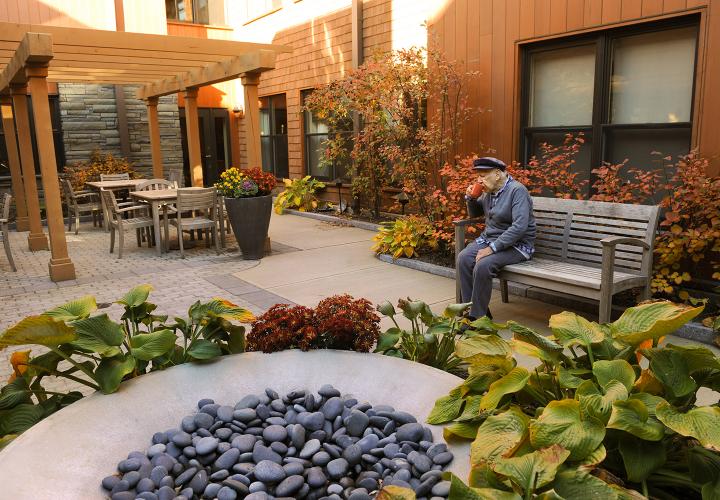High-Quality Care Plans Gave With Alzheimers Care Charlotte Centers
High-Quality Care Plans Gave With Alzheimers Care Charlotte Centers
Blog Article
Creating a Safe and Encouraging Setting for Alzheimer's Care
The development of a secure and helpful environment for individuals with Alzheimer's is vital in boosting their top quality of life. This entails not only physical adjustments within the home, such as lessening risks and including acquainted aspects, but likewise the implementation of organized routines and meaningful activities that satisfy their cognitive requirements. Additionally, comprehending the emotional and emotional dimensions of care can substantially affect their complacency and connection. Checking out these complex methods can reveal crucial understandings into efficient caregiving approaches that may change the daily experiences of both individuals and caregivers.
Comprehending Alzheimer's Requirements
Frequently, people with Alzheimer's disease show a range of needs that need tailored strategies to care. As the condition advances, cognitive decline manifests in various means, impacting memory, thinking, and even the capability to do daily activities. Caregivers need to identify these developing requirements to give appropriate support and guarantee a better of life for those influenced.
One critical facet of comprehending Alzheimer's requirements is recognizing the value of routine and experience. Individuals frequently discover comfort in well established patterns, which can minimize stress and anxiety and complication. Caregivers must strive to produce organized daily timetables that incorporate meaningful tasks aligned with the person's capabilities and interests.
In addition, efficient communication is paramount. Individuals with Alzheimer's may have a hard time to reveal themselves or comprehend intricate language. Caregivers must employ simple, clear language, usage non-verbal hints, and method active listening to promote understanding and link.
Finally, psychological and social demands can not be overlooked. Giving chances for social interaction and preserving relationships can significantly enhance psychological well-being. Caretakers must motivate involvement in neighborhood tasks or family gatherings, advertising a feeling of belonging and objective. Understanding these diverse requirements is crucial for developing a helpful treatment setting.
Designing a Safe Home
Developing a safe home for people with Alzheimer's illness is vital to decreasing threats and promoting independence. Make sure that pathways are well-lit and clear, as appropriate lighting lowers disorientation and improves movement.
Incorporating flexible functions is likewise crucial. Mount grab bars in shower rooms and near stairways, and take into consideration using non-slip floor coverings in damp locations. Furthermore, making use of contrasting shades for floorings and walls can aid in differentiating spaces, helping to mitigate confusion.
Familiarity is essential for people with Alzheimer's. Customizing the setting with familiar objects and photographs can strengthen a sense of belonging and security - Alzheimers Care Charlotte. It is additionally valuable to have an assigned area for daily activities, such as analysis or crafting, which can offer structure to their day
Lastly, executing a safe outside room enables safe exploration while getting in touch with nature. By thoughtfully making the home environment, caregivers can substantially improve the quality of life for individuals living with Alzheimer's illness.
Enhancing Communication Abilities

Non-verbal communication, including facial expressions, gestures, and touch, plays a vital duty in conveying compassion and understanding. Keeping eye call and a tranquil temperament can boost the comfort level of the individual, advertising a feeling of safety.
Moreover, it is very important to practice active listening. This includes being totally existing, showing patience, and allowing the individual to express themselves without disturbance. Repetition may be essential; caretakers ought to be prepared to take another look at inquiries or topics, as individuals with Alzheimer's might battle with memory recall.
Furthermore, making use of visual aids or signs, such as pictures or familiar things, can assist in recognition and engagement. Eventually, enhancing communication abilities has to do with constructing depend on and developing an environment where individuals really feel heard, valued, and recognized, thus enhancing their lifestyle.
Urging Social Interaction
Cultivating significant social interactions can significantly improve the wellness of people with Alzheimer's illness. Engaging with others not only helps battle sensations of isolation but also stimulates cognitive function and emotional health and wellness. Structured social activities, such as team crafts, games and arts, or music treatment, develop possibilities for homeowners to connect with peers and caregivers, which can bring about enhanced mood and minimized anxiousness.
Producing an inviting setting that motivates socializing is essential. This can be achieved by organizing communal rooms that promote communication, such as comfortable seating areas or activity rooms. In addition, including acquainted and culturally appropriate tasks can trigger memories and motivate involvement, enabling people with Alzheimer's to really feel more connected to their previous experiences.
Furthermore, caregivers need to be trained to identify and promote social involvement among residents. Easy gestures, such as initiating discussion or promoting little group discussions, can aid individuals feel valued and included. Consistently arranged social occasions ought to be consistent yet flexible, suiting varying degrees of ability and interest. By focusing on social interaction, we can significantly enhance the lives of those dealing with Alzheimer's, cultivating a sense of community and belonging.
Supporting Caretaker Wellness

To support caretakers, companies should offer normal training and educational sources to enhance their understanding of Alzheimer's disease and caregiving methods. Providing accessibility to break care services allows caretakers to take needed breaks, reducing stress and anxiety and tiredness - Alzheimers Care Charlotte. In addition, fostering an area through assistance groups can assist in psychological sharing and the exchange of practical advice among caretakers, creating a network of shared assistance
Psychological wellness resources, such you can try this out as counseling solutions, can additionally be vital in dealing with the emotional toll caregiving can take. By focusing on caretaker well-being, we develop a more lasting read the article caregiving environment that not only profits the caregivers themselves however additionally enhances the total top quality of treatment gotten by people with Alzheimer's. Eventually, supporting caregivers is a vital part in promoting a compassionate and effective care setting.
Conclusion
To conclude, the production of a secure and encouraging environment for people with Alzheimer's is necessary to boosting their high quality of life. By focusing on security through thoughtful design, promoting emotional wellness with acquainted elements, and promoting engagement with structured routines, caregivers can dramatically affect the overall experience of those impacted by this condition. Sustaining caretaker health is vital, as it eventually contributes to a more thoughtful and reliable care environment.
Repetition may be needed; caregivers must be prepared to revisit subjects or questions, as individuals with Alzheimer's may struggle with memory recall.

Report this page